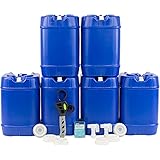Table of Contents
- The Importance of Mental Preparedness
- Coping Strategies During Disasters
- Building Resilience in Advance
- Community Support and Mental Well-being
The Importance of Mental Preparedness
Understanding Mental Preparedness
When it comes to facing disasters, mental preparedness is just as crucial as physical readiness. From my own experience, ensuring your mind is ready to handle a crisis can make all the difference. It’s about having the mental tools to cope with stress and make better decisions under pressure.
One of the first things to understand is that mental preparedness isn’t something you can achieve overnight. It’s a continuous process of building mental fortitude and learning how to remain calm and focused even when everything seems to be falling apart. Think of it like training a muscle; the more you work on it, the stronger it becomes.
Moreover, mental preparedness involves anticipating potential challenges and thinking through scenarios ahead of time. This proactive thinking helps to mitigate the shock and confusion that usually accompanies unexpected events. Trust me, having a mental game plan can ease the burden significantly.
The Mind-Body Connection
I can’t stress enough how connected our mental state and physical health are. When you’re mentally unprepared for a disaster, it can manifest in physical symptoms such as fatigue, headaches, and even more severe conditions. Keeping your mind in check helps maintain your physical well-being.
Staying mentally fit often means engaging in activities that promote both mental and physical health. Regular exercise, for instance, isn’t just good for your body; it’s a fantastic mental booster, too. It releases endorphins, which are natural mood lifters that can help you stay positive during tough times.
Taking care of your mind doesn’t mean ignoring your body. Quite the contrary. The two go hand-in-hand. When one is neglected, the other suffers. So, as you prepare mentally for potential disasters, remember that a healthy body supports a healthy mind and vice versa.
The Role of Mindfulness
Mindfulness is another essential element of mental preparedness. From my own practice, I can tell you that being present in the moment can dramatically reduce anxiety and increase your ability to respond effectively in a crisis situation. It’s all about being aware of your thoughts and feelings without becoming overwhelmed by them.
Practicing mindfulness doesn’t have to be complicated. Simple techniques such as deep breathing, meditation, or even just taking a moment to observe your surroundings can work wonders. These practices help to anchor your mind, making it easier to stay calm and collected during a disaster.
== > What if ... Get a FREE Subscription to PREPARE
Another benefit of mindfulness is that it can help you to respond rather than react. In the midst of a disaster, your initial reaction might be panic or fear, but with mindfulness, you can take a step back, assess the situation, and respond thoughtfully. This shift can make a huge difference in how effectively you manage the crisis.
Coping Strategies During Disasters
Staying Calm Under Pressure
One of the hardest things to do during a disaster is to stay calm. I remember the first time I faced a real emergency; my heart was racing, and my mind was all over the place. Over time, I’ve learned that staying calm is a skill you can develop with practice.
Deep breathing exercises can be incredibly effective. When you feel the panic setting in, take a few moments to inhale deeply through your nose and exhale slowly through your mouth. This simple act can help to regulate your emotions and keep you grounded.
Additionally, having a set of calming routines can be a lifesaver. Whether it’s listening to soothing music, repeating a mantra, or even squeezing a stress ball, find what works for you and practice it regularly. These small acts can provide comfort and stability when you need them the most.
Effective Communication
Communicating effectively during a disaster is vital. From my own experience, clear and concise communication can help to alleviate confusion and ensure that everyone knows what to do. It’s important to establish a communication plan in advance, so everyone is on the same page.
This involves having a designated point of contact and ensuring that everyone involved knows how to reach them. It might also be useful to have a list of critical contacts, such as emergency services, readily available.
Another aspect of effective communication is the ability to listen. In a crisis, it’s easy to become so focused on giving instructions that you forget to listen to others. But remember, communication is a two-way street. By listening, you might learn important information that can help to manage the situation more effectively.
Emotional Support
Having a support system in place is crucial when dealing with a disaster. From my own journey, I’ve found that leaning on friends, family, and even professional counselors can provide the emotional support you need to get through tough times.
Don’t hesitate to reach out for help. Sometimes, just talking about your fears and concerns can make them seem more manageable. Surround yourself with people who are understanding and supportive, and don’t be afraid to lean on them.
On the flip side, be there for others as well. Providing support to those in need can be incredibly rewarding and can also help to take your mind off your own worries. Plus, it fosters a sense of community and mutual support, which is incredibly powerful during a crisis.
Building Resilience in Advance
Developing a Positive Mindset
A positive mindset can go a long way in building resilience. From my own life, I’ve learned that focusing on positive outcomes and maintaining an optimistic outlook can help you to bounce back from adversity more quickly.
This doesn’t mean ignoring the potential dangers or challenges. Rather, it’s about focusing on what you can control and making the best of the situation. Adopting a “glass half full” mentality can significantly affect how you handle stress and setbacks.
One way to cultivate a positive mindset is through gratitude practice. Taking time each day to reflect on what you’re grateful for can help to shift your focus from what’s going wrong to what’s going right. This simple practice can have a profound impact on your mental resilience.
Learning from Past Experiences
Another key to building resilience is learning from past experiences. I’ve found that reflecting on how you’ve handled past challenges can provide valuable insights for future situations. Think about what worked, what didn’t, and what you can do differently next time.
Keeping a journal can be helpful in this process. Writing down your thoughts and experiences can provide a record that you can look back on and learn from. Plus, it’s a great way to process your emotions and thoughts.
It’s also important to recognize your strengths. When reflecting on past experiences, focus on what you did well and how your strengths helped you to overcome challenges. This can boost your confidence and prepare you mentally for future obstacles.
Personal Growth and Self-Care
Building resilience isn’t just about preparing for the worst; it’s also about growing as a person. I’ve found that focusing on personal development and self-care can enhance your overall mental toughness.
Engage in activities that promote personal growth, such as reading, learning new skills, or taking up hobbies that you enjoy. These activities can provide a sense of accomplishment and purpose, which are essential for mental health.
Self-care is equally important. Make time for activities that relax and rejuvenate you. Whether it’s taking a hot bath, going for a walk, or enjoying a cup of tea, self-care practices can help to reduce stress and improve your mental resilience.
Community Support and Mental Well-being
Building a Support Network
Being part of a supportive community can significantly enhance your mental well-being during a disaster. From my experience, having a strong network of friends, family, and neighbors can provide the necessary emotional and practical support.
Start by getting to know your neighbors and community members. Building relationships before a disaster strikes can ensure that you have a reliable support system in place when you need it the most.
Consider joining local groups or organizations that focus on disaster preparedness. These groups can provide valuable resources, training, and a sense of community solidarity that can be incredibly comforting during a crisis.
Participating in Community Initiatives
Active participation in community initiatives can also be beneficial for mental well-being. I’ve found that being involved in community preparedness efforts not only enhances my own readiness but also contributes to the overall resilience of the community.
Look for opportunities to volunteer or participate in local disaster drills and training sessions. These activities can provide practical skills and knowledge that will be invaluable during an actual disaster.
Moreover, community involvement fosters a sense of belonging and purpose, which can be incredibly uplifting for your mental health. Knowing that you’re contributing to the greater good can provide a sense of fulfillment and reduce feelings of helplessness and isolation.
Accessing Mental Health Resources
Lastly, don’t overlook the importance of accessing mental health resources. From my own experience, professional help can make a significant difference in managing stress and anxiety during a disaster.
Be aware of the mental health resources available in your community. This might include counselors, support groups, or crisis hotlines. Having this information on hand can be incredibly helpful when you or someone you care about is struggling.
Consider seeking professional help proactively, rather than waiting until you’re in crisis mode. Regular check-ins with a mental health professional can provide ongoing support and help you to build and maintain your mental resilience.
FAQ
What is mental preparedness, and why is it important for disasters?
Mental preparedness involves having the mental tools and strategies to handle stress and make effective decisions during a disaster. It’s crucial because it helps you stay calm, focused, and resilient, significantly improving your ability to manage the crisis.
How can mindfulness practices help during a disaster?
Mindfulness practices, such as deep breathing and meditation, help to anchor your mind and reduce anxiety. By staying present in the moment, you can respond more effectively rather than reacting in panic, which is vital for managing a crisis efficiently.
What are some coping strategies to use during a disaster?
Some effective coping strategies include staying calm through deep breathing exercises, maintaining clear communication with a designated point of contact, and seeking emotional support from friends, family, or professional counselors. These strategies can help you manage stress and stay focused.
How can community support enhance mental well-being during a disaster?
A supportive community provides essential emotional and practical support during a disaster. Building strong relationships with neighbors and participating in community preparedness initiatives creates a network of mutual aid and solidarity, enhancing overall mental resilience and reducing feelings of isolation.
Related Content
Tomato Powder Can Emergency Food Supply, 329 Servings, 25 Year Shelf Life, Made with Real Tomatoes - Dry Tomato Powder Blend, Ingredient for Cooking and Food Preparation
$33.44 (as of March 4, 2026 13:14 GMT -05:00 - More infoProduct prices and availability are accurate as of the date/time indicated and are subject to change. Any price and availability information displayed on [relevant Amazon Site(s), as applicable] at the time of purchase will apply to the purchase of this product.)Lunch & Dinner Variety Kit Emergency Food Supply, 113 Servings, 25 Year Shelf Life - Dehydrated Meals, Survival Food Camping Essentials, 4 Gallon Bucket
$79.05 (as of March 4, 2026 13:14 GMT -05:00 - More infoProduct prices and availability are accurate as of the date/time indicated and are subject to change. Any price and availability information displayed on [relevant Amazon Site(s), as applicable] at the time of purchase will apply to the purchase of this product.)Sterno 100-Hour Emergency Candles - Long Burning Unscented Candles for Emergencies and Power Outages - Burns Up to 100 Hours - Set of 6 - Clean Burning Liquid Paraffin
$36.99 (as of March 4, 2026 13:14 GMT -05:00 - More infoProduct prices and availability are accurate as of the date/time indicated and are subject to change. Any price and availability information displayed on [relevant Amazon Site(s), as applicable] at the time of purchase will apply to the purchase of this product.)Emergency Food Rations Meal Ready To Eat, Long Self Life 18400 Calorie Survival Tabs Perfect for Camping, Hiking, Army Outdoor Disaster, 20 Pack with Tin Box
$79.99 (as of March 4, 2026 13:14 GMT -05:00 - More infoProduct prices and availability are accurate as of the date/time indicated and are subject to change. Any price and availability information displayed on [relevant Amazon Site(s), as applicable] at the time of purchase will apply to the purchase of this product.)Legacy Food Storage Emergency Water Storage Containers, Long Term 5 Gallon Water Tank - 6 Stackable Food Grade Tanks Included, for Camping, Prepping, Survival - 30 Gallon Total Capacity
Now retrieving the price.
(as of March 4, 2026 13:14 GMT -05:00 - More infoProduct prices and availability are accurate as of the date/time indicated and are subject to change. Any price and availability information displayed on [relevant Amazon Site(s), as applicable] at the time of purchase will apply to the purchase of this product.)





